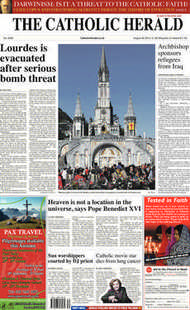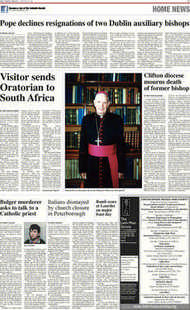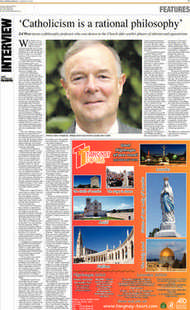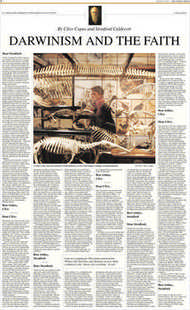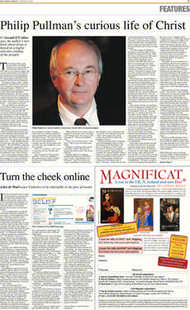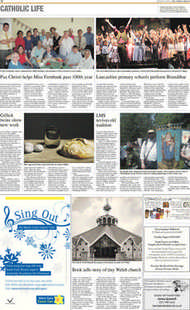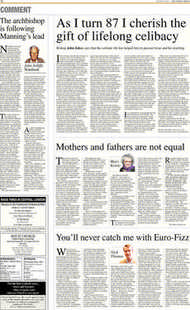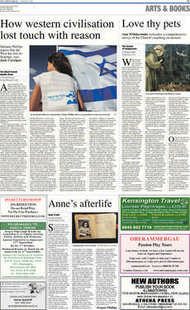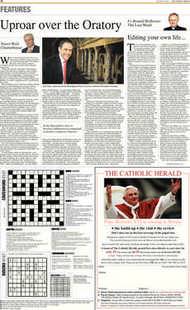Page 9, 20th August 2010
Page 9

Report an error
Noticed an error on this page?If you've noticed an error in this article please click here to report it.
Tags
Share
Related articles
Pullman’s New Book ‘not Fit For Children’, Says Author
Closing Children's Minds
Bishops Withdraw Review Of Pullman Film After Protests
The Big Read And The Big Lie
History Will Answer Philip Pullman
Philip Pullman’s curious life of Christ
The teaching of Jesus wins sincere praise from Philip Pullman. In a recent interview with Readings Monthly he said: “He’s a very attractive figure. He was one of the greatest storytellers of all time (and of course that interests me), and he had an unparalleled gift for making phrases that linger in the memory with the force of revelation.” The phrase of Jesus about “whited sepulchres” led Pullman in that interview to speak out once again against organised religion: “When you consider the poor, wandering, hand-tomouth figure of this peripatetic prophet and healer, who had no place to lay his head, and you compare him with the fantastic and unimaginable wealth of splendour of the Pope in all his glory and his power, what can you do but ... well, shake your head?” The way Pullman re-tells the story of what Jesus taught and said, he frequently lets a voice of genuine spiritual authority come through. His version of a familiar saying or narrative often conveys what Archbishop Rowan Williams, reviewing The Good Man Jesus and the Scoundrel Christ in the Guardian, calls “a pitch-perfect rendering in modern idiom, carrying something of the shock and compelling attraction of the original Gospel text”.
The archbishop gives an example: “When he [Pullman] relates the story of Jesus healing a demon-possessed man in the synagogue, his Jesus responds to the shouts of the disturbed man with: ‘You can be quiet now. He’s gone away’ – subtly paraphrasing the ‘be silent and come out of him in the Gospel’.” Rowan Williams comments: “This eloquently suggests the sort of sense a modern reader might make of the story, without reducing the manifest authority of the words of Jesus.” My own favourite example is Pullman’s vivid and effective rendering of the exchange with a lawyer that led Jesus to tell the parable of the Good Samaritan (Luke 10:28-37). The lawyer began by asking: “Teacher, what must I do to inherit eternal life?” Jesus prompted the lawyer into citing what the law says: “You must love the Lord God with all your heart, and with all your soul, and with all your strength, and with all your mind. And you must love your neighbour as you love yourself.” “That’s it,” said Jesus, “you’ve got it. You know the law. Do that, and you’ll live.” Then, in response to the lawyer’s question, “who is my neighbour?”, Jesus told the story of the wounded traveller and the Samaritan who helped him. When asked by Jesus who proved “a neighbour to the man who was robbed on the Jericho road”, the lawyer could only answer: “The one who helped him.” “That’s all you need to know,” said Jesus. “Off you go, and do the same thing.” Pullman’s rendering of the conclusion packs a punch when set over against the usual version: “Go and do likewise.” Pullman spends two chapters, retelling the Sermon on the Mount – in his words: “Jesus Preaches on a Mountain”. The first of these two chapters paraphrases the Beatitudes, from Matthew 5:3-12 and Luke 6:2023, and the woes from Luke 6:24-26 (“there will be some who will be cursed, who will never inherit the Kingdom of God”).
Pullman maintains Jesus’s language about the Kingdom of God, but tips the message of the Beatitudes away from “loving the Lord God” in the direction of “loving your neighbour as you love yourself”. Let me give an example, the sixth of Matthew’s Beatitudes. It is usually translated: “Blessed are the pure of heart. They shall see God.” God disappears in Pullman’s rendering of what being “pure in heart” will bring: “Those who are pure in heart and think no evil of others – they will be blessed.” This interpretation fails to match the sense commentators normally find in this Beatitude: purity of heart involves fidelity to the divine commands and sincere worship of God.
The three chapters in Matthew’s Sermon on the Mount (Mt 5-7) have entered the imagination of the world. For many, Christians and others alike, these chapters present the most sublime and compelling code of human conduct that they have ever read. I can understand why some reviewers found Pullman’s introduction flat, almost as if Jesus were speaking to children in a primary school: “And today I’m going to tell you who’s going to be received into the Kingdom, and who isn’t, so pay attention.” What disturbs me about Pullman’s presentation of the teaching of Jesus is the significant material that he leaves out. In a chapter entitled “Difficult Stories” he paraphrases attractively three parables: the Labourers in the Vineyard (Mt 20:1-16), the Crafty Manager (Lk 16:1-8) and the Pharisee and the Tax Collector (Lk 18:9-14). But Pullman omits what we might call the “difficult teaching”, those passages where Jesus implied that he possessed an authority that put him on a par with God.
Jesus spoke with his own authority, at times prefacing his teaching with “I say to you” (Mt 5:21-44) and not with such prophetic rubrics as “thus says the Lord” or “oracle of the Lord”. It was above all the “objects” over which he asserted authority that made such claims startling. Either by what he said or by what he did (or both), Jesus claimed authority over the observance of the Sabbath (eg Mk 2:23–28; 3:1–5), the Temple (Mk 11:15–17), and the Law – three divinely authorised channels of salvation. Let me briefly recall some aspects of the authoritative attitude towards the divine Law and the Temple that Jesus showed in his ministry and that Pullman leaves out of consideration.
Jesus took it upon himself not only to criticise the oral law for running counter to basic human obligations (Mk 7:9-13) but also to set aside the written law on such matters as retribution, divorce, oaths, and food (Mt 5:21-48; Mk 7:15, 19). This was to put himself on a par with the divine Lord who had prescribed on these matters through Moses: “Of old it was said to you by God speaking through Moses, but I say to you.” Apropos of the Temple saying, it is admittedly hard to establish its original form (Mk 14:5759; Acts 6:13-14). But it involved some claim that his mission was to bring a new relationship between God and the chosen people, which would supplant the central place of the current relationship, the Temple in Jerusalem. Jesus was himself to replace the Temple and its cult with something better (“not made by human hands”).
Seemingly on a level with Jesus’s astonishing assertion of his personal rights over the day, place, and law of Jewish life, was his willingness to dispense with the divinely established channels for the forgiveness of sins (sacrificial offerings in the Temple and the mediation of priestly authorities) and to take on God’s role by forgiving sins in his own name. He did this by word (Mk 2:1-11; Lk 7:47-49) and by table fellowship with sinners. Jesus claimed the authority to mediate the forgiveness of sins committed against God.
Jesus used his favourite self-designation, “Son of Man”, when claiming to be decisive for the final relationship between human beings and God: “every one who acknowledges me before human beings, the Son of Man will acknowledge before the angels of God. But those who deny me before human beings will be denied before the angels of God” (Lk 12:8-9). Jesus understood the full and final salvation of human beings to depend upon their present relationship with him.
In these and other ways, during his ministry Jesus gave the impression of setting himself on a par with God. One can understand members of the Sanhedrin charging Jesus with blasphemy. They feared that he was not merely a false prophet but was even usurping divine prerogatives (Mk 14:64). In his chapter on the trial of Jesus (“Jesus before the Council”), Pullman carefully skirts around this issue.
Besides avoiding passages where Jesus implicitly claimed for himself divine authority, Pullman deftly modifies some episodes so as to shift attention away from the person of Jesus and his unique identity as Son of God come among us.
blog comments powered by Disqus


